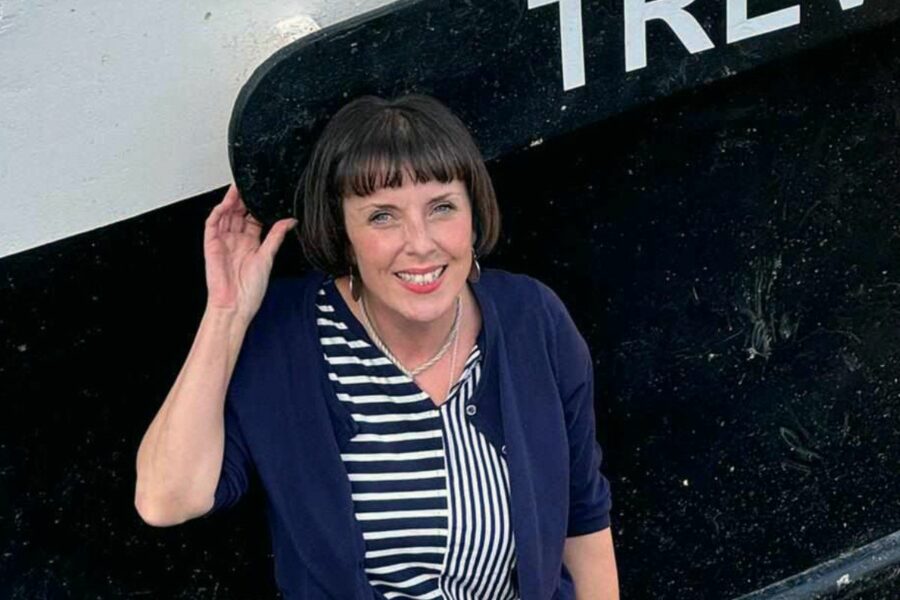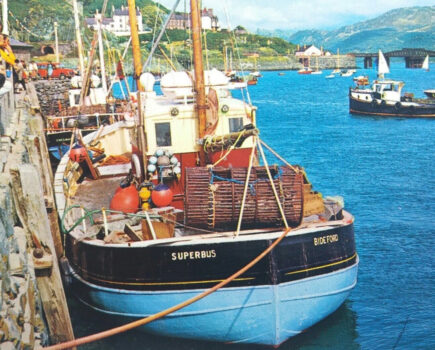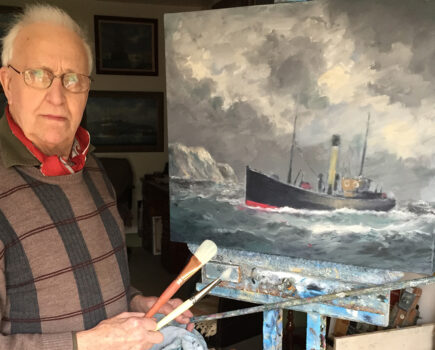Share a day in the life of South Devon and Channel Shellfishermen’s executive officer
I’m bombarded with paperwork, and sometimes it’s not a great deal of good news – particularly in recent years. It can be confrontational or controversial, and it’s been quite hard,” Beshlie Pool, executive officer of South Devon and Channel Shellfishermen (SDCS), told Fishing News.
“Then one of my members will phone me and bring me back to reality – and I realise that I’m sitting in the office dealing with the issues for these people – good people, working really hard. So if I can help them, then I’ll do it.”
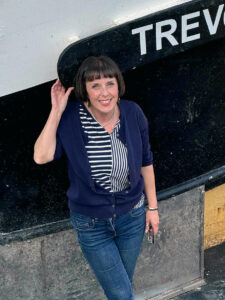
Beshlie Pool, executive officer of South Devon and Channel Shellfishermen, paying a visit to the Trevose PH 64. “I enjoy the days when I get out and about, as I am heavily office-based. But if there’s something happening – say a safety talk or meeting – then I’m out and about with our members, and that always reminds me why I do this job.”
Growing up in Teignmouth, just a short distance from the sea, Beshlie soon became involved with the local industry. “Everyone jokes that my first job was taking shore crabs out of the salmon nets on the river. Really, it was just to keep me out of trouble and keep me quiet. I was paid 20p a crab, but I was a bit frightened of the claws.”
However, it wasn’t until the age of 22 that Beshlie began laying the foundations for her current role. “I was working in the pub where all the local fishermen would drink. I was getting really bored with not using my brain, and I was influenced to go back to university by the people I was seeing on a daily basis, who would come in the pub and tell me how terrible everything in the industry was.
“One of my good friends was a skipper, and he couldn’t read or write. When the legislation for logbooks came in, he changed his job. I remember thinking: ‘He’s so good at his job – why does he have to leave it?’ I was a young upstart, and thought, right, I’m bored with hospitality – I’m going to go back to university.”
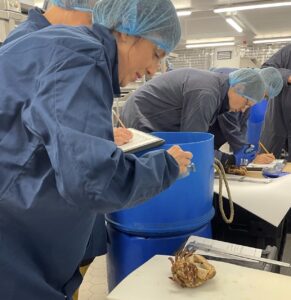
Beshlie at the Blue Sea Food Company with Devon and Severn IFCA, working on the soft crab FISP. “I encounter all sorts of things over the course of a day. We’re leaseholders of the quayside, so I could be dealing with things such as a failed crane – like I am this week – or meeting with MPs and ministers. I could also be on a quayside poking crabs and talking with our fishermen, or meeting with our processor members.”
After graduating, Beshlie initially enrolled to study for a master’s degree, taking on a voluntary role alongside as secretary for the Teign Fishermen and Watermen’s Association. However, keen to gain practical, employed experience, she left her studies and secured a position as a fisheries officer with the Marine and Fisheries Agency – later the MMO – where she stayed for seven years.
In 2014, Beshlie joined SDCS. Founded in 1968, the co-operative represents some 82 vessels and their crew, along with processors, merchants, exporters and gear suppliers. This broad membership brings a diverse range of tasks and responsibilities.
“I run the business, I do the consultation responses, I look after the quayside, and I answer individual member queries, and queries from organisations that need to know what people think. So it’s quite a busy role!
I usually start my day between 7.30am and 8.30am with a cup of coffee or tea at the laptop, reading the emails that have come in overnight – because invariably there will be some.
“There’s quite a lot of office-based work for me nowadays, which has increased post-Brexit, and with FMPs and those kind of things. My job has changed since those decisions were made, and there’s a lot of heavy paperwork coming in from Defra, MMO, MCA, IFCAs…
“As a result, I do a lot of reading. I also do a lot of what I call translating. Some of the material coming out from regulators and policy bodies is hard, and it’s not written in a way that suits the audience which needs to understand it.
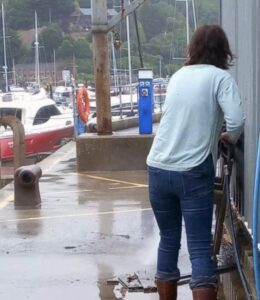
Working for a small organisation, Beshlie’s role sees her take on a wide variety of tasks – including some quayside maintenance duties. “There’s enough work for two or three people – but like most fishing organisations, we’re not set up in a way to resource that. Most of us in these types of organisations are doing the best we can with limited resources.”
“I try to make that information shorter, more understandable, by pulling out the salient points and communicating those to our membership, in various ways – that could be emails, WhatsApp, phone calls…
“In our membership – like in society – we have everyone from people running multi-million-pound businesses to those who might struggle with literacy. I try to pick the lowest common denominator and make everything understandable from their point of view.”
As well as disseminating information from public bodies, Beshlie also does the reverse – helping the co-operative’s members to get their message heard.
“I feel that everybody in fisheries probably wants the same thing – but we all speak slightly different languages. My membership is wonderful, and they’re really articulate – but sometimes, if they’re in front of a regulatory or policy person, they lose a bit of confidence.
“They don’t feel able to put what they think into the words they think they ought to use for those ‘important people with clipboards’. I package up those thoughts and put them in a context that the ‘people with clipboards’ can understand.” Beshlie’s day can also see her encounter a range of ad hoc requests.
“If a member phones me up and tells me I need to look at MarineTraffic as there’s a trawler going through some of our gear, I have to drop everything. I have to get hold of whoever it is running that trawler to try to get them off the gear.
Those things always take priority, because that’s a direct member issue.” Those issues can see Beshlie working well into the evening. “If I start at around 7.30am I like to have shut my laptop by about 4.30pm – but that doesn’t mean the phone will stop ringing.
“The very end of the day, at around 9.30pm, is when I finally turn off the work phone.”
This feature was taken from the latest issue of Fishing News. For more up-to-date and in-depth reports on the UK and Irish commercial fishing sector, subscribe to Fishing News here or buy the latest single issue for just £3.50 here.
Sign up to Fishing News’ FREE e-newsletter here.

